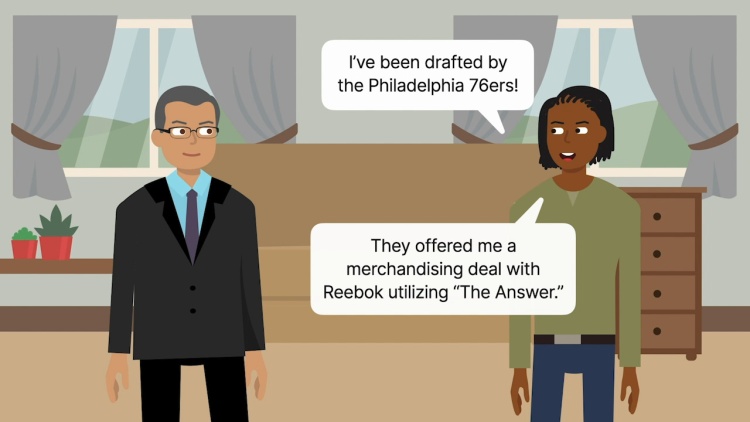Blackmon v. Iverson
United States District Court for the Eastern District of Pennsylvania
324 F. Supp. 2d 602 (2003)

- Written by Josh Lee, JD
Facts
Jamil Blackmon (plaintiff) was a family friend of Allen Iverson (defendant). Blackmon provided support to Iverson’s family beginning in 1987, including financial support and the occasional provision of a place to stay. In 1994, Blackmon suggested that Iverson, then a promising high-school-basketball player, use the nickname The Answer while playing in summer-league tournaments. Blackmon and Iverson discussed potential marketing aspects of the nickname in connection with clothing, sports apparel, and shoes if Iverson was later drafted by the National Basketball Association (NBA). Later that day, Iverson promised to pay Blackmon 25 percent of the proceeds from any products using the nickname. Blackmon devoted time and money to developing the nickname concept, including hiring a graphic designer to develop logos. Over the next few years, as Iverson progressed through college basketball and was eventually drafted by NBA team the Philadelphia 76ers, Iverson repeatedly reiterated his promise to pay Blackmon 25 percent of proceeds associated with the nickname. Iverson persuaded Blackmon to move to Philadelphia during the 1997–1998 NBA season so Blackmon could begin seeking profits from his ideas. Iverson entered into a contract with Reebok, which began manufacturing and selling merchandise using the nickname. Iverson again assured Blackmon that Blackmon would receive payment. However, Iverson never paid Blackmon, and Blackmon eventually sued Iverson for breach of contract, idea misappropriation, and unjust enrichment. Iverson moved to dismiss the lawsuit.
Rule of Law
Issue
Holding and Reasoning (McLaughlin, J.)
What to do next…
Here's why 907,000 law students have relied on our case briefs:
- Written by law professors and practitioners, not other law students. 47,100 briefs, keyed to 996 casebooks. Top-notch customer support.
- The right amount of information, includes the facts, issues, rule of law, holding and reasoning, and any concurrences and dissents.
- Access in your classes, works on your mobile and tablet. Massive library of related video lessons and high quality multiple-choice questions.
- Easy to use, uniform format for every case brief. Written in plain English, not in legalese. Our briefs summarize and simplify; they don’t just repeat the court’s language.





